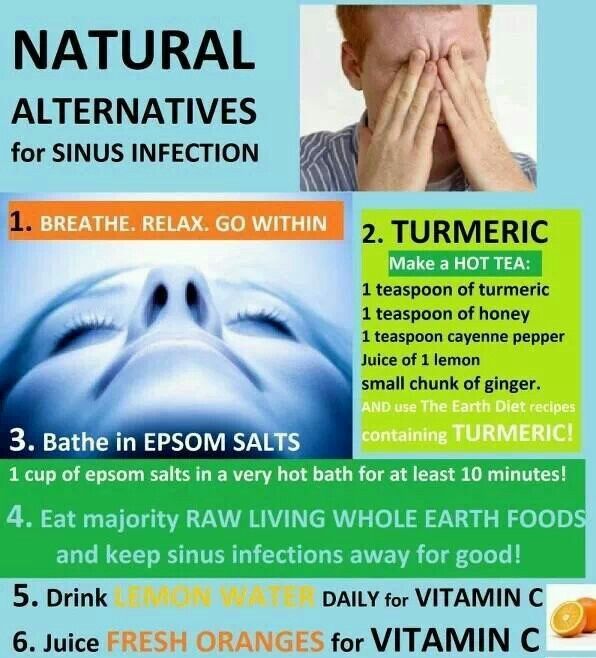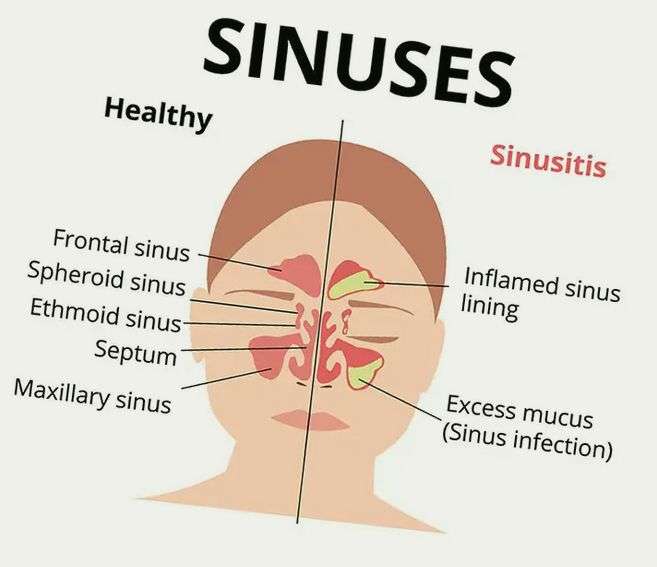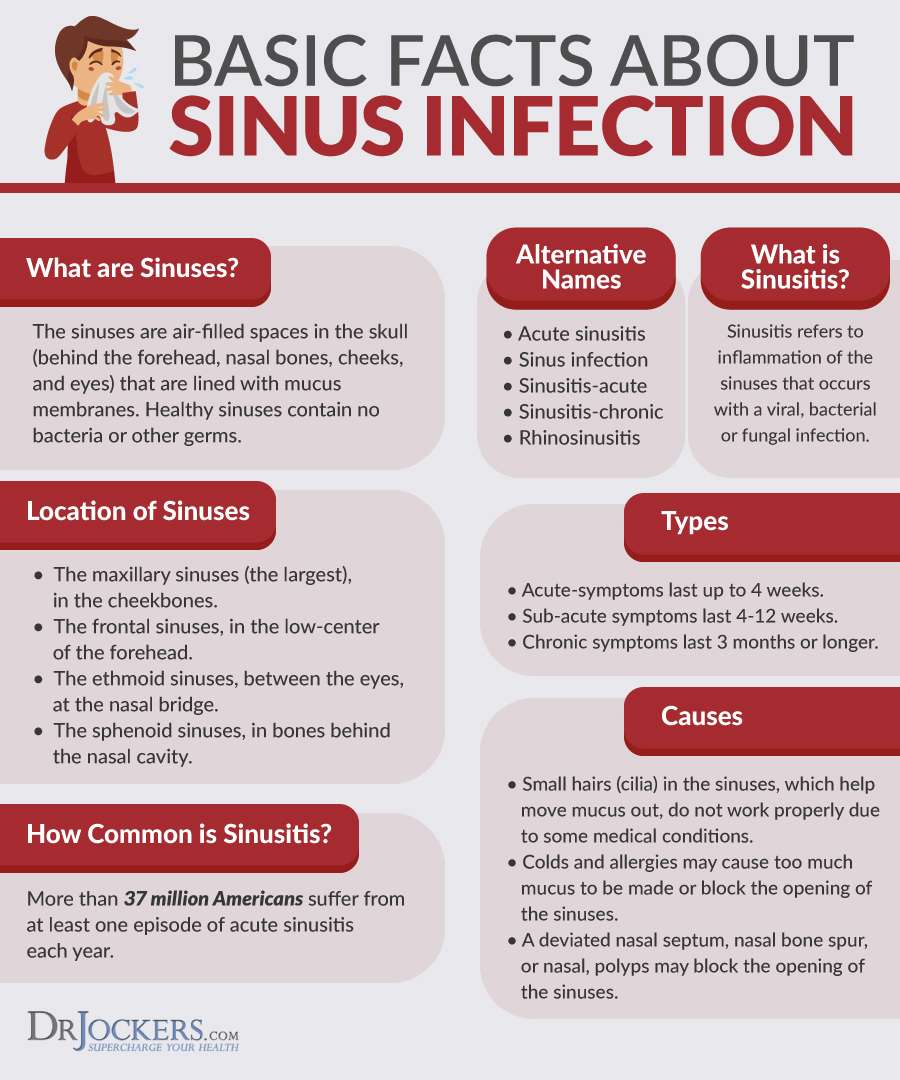When To Contact A Doctor
Reach out to your physician or a doctor if you have severe symptoms or if the following symptoms persist for longer than ten days or keep returning:
- Nasal discharge
- Facial and sinus pain
Because the cause of your sinus infection will determine the appropriate treatment options, its crucial to see a doctor for a diagnosis sooner rather than later. Several online tools can help you find a local provider covered by your insurance.
If you think you have a chronic or recurring sinus infection, think about getting a referral to an otolaryngologist, also called an ear, nose, and throat doctor. A CT scan and other diagnostic tests might be necessary to determine the cause of your condition.
How Can You Treat Sinusitis Without Antibiotics
Whether sinusitis is caused by bacteria or by a virus, most people get better even if they don’t take antibiotics.1 Home treatment for sinusitis can help relieve your symptoms. Here are some things you can do:
- Drink plenty of fluids to thin your mucus.
- Apply moist heat to your face for 5 to 10 minutes. Do this at least 3 times a day.
- Breathe warm, moist air from a steamy shower, a hot bath, or a sink filled with hot water.
- Use saltwater nasal washes to help keep your nasal passages open and to wash out mucus and bacteria. You can buy saline nose drops or sprays at a pharmacy or make your own saline solution at home. If you make saline at home, use distilled water or water that has been boiled and then cooled. You may also find it helpful to gargle with warm salt water.
- Ask your doctor if you can take over-the-counter medicines such as pain relievers and decongestants to help you feel better. Be safe with medicines. Read and follow all instructions on the label.
- If you need to blow your nose, do it gently. Blowing your nose too hard may force thick mucus back into your sinuses. Keep both nostrils open when you blow your nose.
When Are Antibiotics Prescribed For A Sinus Infection
Your doctor will consider antibiotic treatment if you do not see relief from these initial treatments. If you develop a fever, or tenderness and pain in your teeth, you may be experiencing symptoms of a bacterial sinus infection.
Not all antibiotics are effective for treatment of bacterial sinus infections, so your doctor will look at your medical history and current symptoms to determine the best antibiotic treatment.
Dont Miss: Will Zicam Help Sinus Infection
Don’t Miss: Advil Sinus Congestion & Pain Coated Tablets
What Is A Sinus Infection Or Sinusitis
Inflammation of the air cavities within the passages of the nose is referred to as sinusitis. Sinusitis can be caused by infection , but also can be caused by allergy and chemical irritation of the sinuses. A sinus infection occurs when a virus, bacterium, or fungus grows within a sinus.
Sinusitis is one of the more common conditions that can afflict people throughout their lives. Sinusitis commonly occurs when environmental pollens irritate the nasal passages, such as with hay fever. Sinusitis can also result from irritants, such as chemicals or the use and/or abuse of over-the-counter nasal sprays, and illegal substances that may be snorted or inhaled through the nose. About 30 million adults have âsinusitis.â Colds differ from sinusitis and are only caused by viruses and last about seven to 10 days while sinusitis may have many different causes , and usually last longer with more pronounced and variable symptoms.
Donât Miss: Oral Antibiotics For Eyelid Infections
Throat Irritation And Cough

As discharge from your sinuses drains down the back of your throat, it can cause irritation, especially over a long period of time. This can lead to a persistent and annoying cough, which can be worse when lying down to sleep or first thing in the morning after getting up from bed.
It can also make sleeping difficult. Sleeping upright or with your head elevated can help reduce the frequency and intensity of your coughing.
Donât Miss: What Is The Difference Between A Yeast Infection And Chlamydia
You May Like: Whats In A Sinus Cocktail Shot
When Antibiotics Dont Work
Some patients suffer from recurring sinus infections. If your sinus infection does not improve within five to seven days after you finish the whole course of antibiotics, or if you experience another sinus infection within a few weeks, you may be referred to an Ear, Nose and Throat specialist for treatment.
When Does Antibiotic Resistance Occur
Antibiotic resistance occurs in a persons own body and within the community when certain drugs no longer work for a specific type of germ. This can occur when bacteria change in response to exposure to antibiotics so that the antibiotics no longer work efficiently against the bacteria.
Unfortunately, it’s hard to know if a sinus infection is bacterial, viral, or has other causes based on symptoms alone. Because viral sinus infections tend to improve in 5 to 7 days, healthcare providers will usually only prescribe antibiotics if your symptoms go on for longer than this. A sinus infection that persists for longer than a week or continues to get worse during this time period is more likely to be bacterial.
Therefore, allergists and other specialists recommend limiting the use of antibiotics unless:
- Symptoms last over seven to 10 days
- A fever is present
Recommended Reading: Does Guaifenesin Help With Sinus Congestion
You Probably Dont Need Antibiotics For Sinus Infections Or Sinusitis
If you were wondering whether you needed antibiotics for a sinus infection, heres why antibiotics are rarely the right treatment for chronic sinusitis. According to the CDC, 9 out of 10 sinus infections are caused by viruses, while only 1 out of 10 cases of sinusitis are caused by bacterial infections. Antibiotics can only treat bacterial infections, and therefore an antibiotic treatment will not be effective for most sinus infections caused by chronic sinusitis.
For people with chronic sinusitis, taking antibiotics to clear up as many as four sinus infections a year can have some unintended long term consequences. The more often you take antibiotics for basic illnesses, the worse your body becomes at actually fighting them off. Not only will your sinus infections keep coming back, the effectiveness of antibiotics against other, more serious infections could become compromised.
How K Health Can Help
Did you know you can get affordable care with the K Health app?
to check your symptoms, explore conditions and treatments, and if needed text with a doctor in minutes. K Healths AI-powered app is HIPAA compliant and based on 20 years of clinical data.
K Health has strict sourcing guidelines and relies on peer-reviewed studies, academic research institutions, and medical associations. We avoid using tertiary references.
Don’t Miss: Can Sinus Infection Cause Migraine Headaches
Best Antibiotic Treatment For Sinus Infection
Physicians frequently recommend ten to 14 days of amoxicillin or amoxicillin-clavulanate treatment when a person has bacterial sinusitis.
However, amoxicillin is less effective in some areas because of antibiotic-resistant bacteria. In these cases, a physician could recommend using another antibiotic when there is no improvement in sinusitis symptoms after a couple of days.
Some alternatives to treat sinusitis include:
Do I Need Antibiotics For Sinus Infection
A person doesnt always require antibiotics to cure sinusitis. This is because most sinusitis will get better with different treatments. Additionally, since a virus causes most sinusitis conditions, antibiotics wont help a person get better and can cause unwanted side effects.
Side effects can range from minor rashes to severe health conditions, including antibiotic-resistant infections. You should discuss your symptoms with your physician and find the best treatment for your specific cause. For example, doctors only suggest antibiotics when they believe you have bacterial sinusitis.
Read Also: Runny Nose Sinus Pressure Medicine
Will My Sinus Infection Clear Up On Its Own
Topics in this Post
The first few weeks of the common cold aren’ fun, but the acute sinusitis that can develop afterwards doesn’t help either. Unfortunately, sinus congestion and the common cold go hand in hand. Acute sinusitis frequently is caused by the common cold, but also can be caused by allergies and bacterial and fungal infections.
When Did You First Start Experiencing Sinus Issues Why Did You Decide To Try Virtuwellcom

I had been experiencing pain, congestion and other issues with my sinuses for well over a week. I had considered going to clinic, but the idea of dragging all of the boys along with me sounded horrible. I remembered my husband used virtuwell.com for his sinus infection last year and within a few days he was feeling better.
While making dinner, I logged onto virtuwell.com. It took me about 10 minutes to answer the questions about my condition and medical historywith at least 5 interruptions from the boys. I got my treatment plan soon after, which told me I had a bacterial sinus infection and a prescription was being sent to our Pharmacy in about an hour.
Read Also: Sinus Infection Symptoms Home Remedies
When Do I Really Need Antibiotics For A Sinus Infection
When do I really need antibiotics for a sinus infection? is a question many patients have when suffering from bothersome sinus and allergy problems. While sinus infections can be quite painful, antibiotics often do not help in treating the condition.
Sinus infections affect approximately 37 million people in the U.S. each year and can be caused by:
- Nasal polyps or deviated septum causing nasal obstruction
- Irritants/pollutants
The majority of sinus infections are viral in nature, and antibiotics do not cure viral infections. Taking antibiotics for viral infections also will not:
- Keep you from being contagious to others
- Relieve symptoms or make you feel better
In order to distinguish a bacterial sinus infection from an infection caused by a virus or other contributing factor, your doctor will observe your symptoms and possibly conduct other tests, such as a CT scan or cultures.
Antibiotics are only effective on bacterial infections, and even in cases involving bacteria, the body can often cure itself of mild or moderate infections within a few days.
Why Are Internal Medicine Physicians The Best Choice For Sinus Infection Treatment
Our physicians concentrate on the entire body, paying careful attention to how its systems interact. This gives our internists a deeply focused perspective on not only alleviating symptoms, but prescribing a form of treatment to help relieve your chronic allergies.
Often, treatment begins with determining if your chronic sinus problems are caused by allergies and if so, what substance is causing the irritation. In this case, allergy testing can provide vital information.
Not sure if an allergy test is right for you? We created a blog with a list of three questions you should consider in order to get the answer.
Allergies can be treated with prescription or over-the-counter medication. However, if you have chronic problems, you should consider immunotherapy, which is sometimes referred to as allergy shots.
This process allows your body to decrease its sensitivity to certain allergens, providing long-lasting relief. The benefits of immunotherapy continue long after the treatment has ended.
If you want to know more, check out our earlier blog, What Is Immunotherapy for Allergy Treatment?
Don’t Miss: What Medicine For Sinus Infection
Instances Of Chronic Sinusitis
Over 30 million Americans have sinus infections each year. However, some people may have sinus infections more frequently.
People with chronic sinusitis experience different levels of symptom severity. Some may have symptoms clearing up in a few days, while some may suffer longer. Even if you only have minor sinus infections but experience them frequently, you need to visit an otolaryngologist. A sinus infection once in a while is no big deal, but having this issue multiple times a year needs medical attention.
An otolaryngologist can also help diagnose conditions or anything that can be a risk factor for sinus infections. Here are several risk factors your doctor can identify:
- Chronic nasal congestion
- Respiratory tract infections
Chronic nasal congestion is a significant risk factor as it may cause bacterial buildup. This can then cause recurring sinus infections.
You may need a nasal procedure for permanent relief in the case of a deviated septum, nasal polyps, or chronic sinusitis. Your doctor might surgically remove abnormal tissue growth or enlarge and clean your nasal drainage area with a balloon sinuplasty.
Chronic allergies may need immunotherapy to reduce your immune systems reactivity to allergens. Your otolaryngologist may have access to allergy treatments to provide you long-term relief.
Two Types Of Sinus Infections
Lets differentiate between acute and chronic sinus infections. Acute sinus infections can last up to 4 weeks. If you are experiencing sinus infection symptoms for longer than 2 weeks, it doesnt mean you have a bad case of sinusitis this is normal. If you experience symptoms for longer than 4 weeks, this can be considered subacute anything that lasts longer than 12 weeks is considered chronic.
Now, lets differentiate between bacteria and viruses. Either of the two can infect the body, and each warrants a different course of treatment. Bacterial infections require antibiotics, while viral infections do not they resolve themselves. All you can do in the latter case is to drink plenty of fluids, rest, and take decongestants. The majority of cases are viral, in which case your doctor cant prescribe you with anything other than decongestants.
Read Also: Advanced Allergy Asthma & Sinus Care
Antibiotics For Sinus Infection
If youve ever had a sinus infection, you know how uncomfortableand persistentthey can be.
You cant breathe normally due to nasal congestion, postnasal drip interferes with sleep, and sinus pain makes your face ache.
Add in possible nasal discharge, headache, cough, fatigue, and fever, and no wonder you just want it to go away.
Unfortunately, sinus infections may last longer than you think: Acute sinusitis lasts up to four weeks, while chronic sinusitis lasts at least three months.
Although these infections dont require treatment, if youre uncomfortable, over-the-counter remedies such as decongestants and nasal saline irrigation, as well as lifestyle changes like increased fluid intake, may provide some symptom relief.
On the other hand, in most cases, antibiotics dont help treat a sinus infection and may cause more harm.
However, antibiotics can be appropriate for some sinus infections. It all comes down to whether a virus or bacteria is causing the infection.
To help clear up the confusion about antibiotics for sinus infections, in this article, Ill explain the differences between viral and bacterial sinus infections.
I will also discuss when to use antibiotics to treat a sinus infection and what types of sinus infections antibiotics treat.
Long Term Solutions For Chronic Sinusitis
Fortunately, chronic sinusitis does not have to be a permanent condition. If you are suffering or believe that you may be suffering with chronic sinusitis, Balloon Sinuplasty may be the best solution for you. Balloon Sinuplasty is a minimally invasive surgery that reshapes your anatomy to allow your sinuses to drain properly.
As one of Houstons leading providers of Balloon Sinuplasty, Dr. Kaplan of Kaplan Sinus Relief can help provide you with effective, long term relief from sinusitis. Kaplan Sinus Relief even offers IV sedation for enhanced comfort during your Balloon Sinuplasty experience. Schedule a consultation today to discuss how Kaplan Sinus Relief can help relieve your chronic sinusitis.
Location
Don’t Miss: Best Drink For Sinus Infection
Why Are Antibiotics Important
Antibiotics are one of the most common classifications of drugs used to treat bacterial infections. Since their introduction to the world of medicine, they have helped treat countless people, especially those with infectious diseases.
Antibiotics are very crucial during surgeries and are used to prevent patients from getting any infections from the cut. Without antibiotics, there is a higher chance of blood poisoning and the more complicated surgeries would not be possible to perform.
Read Also: Sinus Infection And Ear Pain
How Do Doctors Diagnose Ear Infections

Your doctor can diagnose an ear infection by asking about your childs symptoms and doing a physical exam. As part of the exam, they will look at your childs ear canal and eardrum with a special instrument called an otoscope.
Using the otoscope, the doctor can see the color and position of the ear drum and look for fluid in the middle ear. A red, bulging eardrum with infected fluid in the middle ear indicates an infection.
Recommended Reading: What Helps Jaw Pain From Sinus Infection
Recommendations For Nonantimicrobial Therapy
Intranasal steroids have not been conclusively shown to be of benefit in cases of acute sinusitis. One meta-analysis of 4 double-blind, placebo-controlled trials of intranasal corticosteroid treatment in acute rhinosinusitis supports its use as monotherapy or as an adjuvant therapy to antibiotics. However, a randomized, controlled trial of antibiotics and intranasal steroid showed no treatment benefit of intranasal steroids, either alone or with antibiotics.
In a literature study, van Loon et al concluded that only limited evidence exists regarding the efficacy of intranasal corticosteroids in relieving the symptoms of recurrent acute rhinosinusitis. The best evidence, according to the investigators, came from a single study, which had a low bias risk but only moderate directness of evidence according to that report, intranasal corticosteroids may shorten the time needed to achieve symptom relief.
No available data suggest that antihistamines are beneficial in acute sinusitis. In fact, antihistamines may cause harm by drying mucous membranes and decreasing clearance of secretions. Antihistamines are beneficial for reducing ostiomeatal obstruction in patients with allergies and acute sinusitis however, they are not recommended for routine use for patients with acute sinusitis. Antihistamines may complicate drainage by thickening and pooling sinonasal secretions.
Recommended Reading: Best Relief For Sinus Pain And Pressure